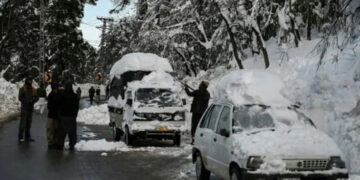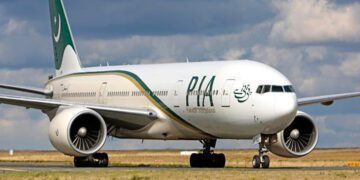![]() Follow Us on Google News
Follow Us on Google News
Prime Minister Shahbaz Sharif visited Gilgit-Baltistan yesterday and met the flood victims. He assured to solve the problems faced by the flood victims and also reiterated his commitment to fully support the resettlement of the affectees.
If the loss of lives and property due to flood in Gilgit-Baltistan is reviewed till August 28, 17 people died and 6 were injured and the economic loss was 7 billion 406 million rupees. 22 power houses were damaged out of which 19 were temporarily restored.
In Gilgit-Baltistan, 49 roads were also damaged by flood, 41 were temporarily restored, and 78 drinking water supplies were affected out of which 65 were temporarily restored. 56 bridges were damaged, of which 43 were temporarily restored, but there are fears of further damage due to floods in Gilgit-Baltistan in the last 5 days.
Gilgit-Baltistan has a total area of 7,971 square kilometers with a population of 8.1 million. Balti, Shina, Khowar and Wakhi languages are mostly spoken here. Gilgit, Baltistan and Dia Mir are the 3 divisions here. To its northwest, the Wakhan Belt of Afghanistan separates the region from Tajikistan.
This region of dreamy beauty also has 50 peaks above 7000 meters and the world’s 3 highest and most difficult mountain ranges meet here which we know as Hindu Kush, Himalayas and Karakoram.
If you remember the Karakoram mountain range, two of the world’s second highest peaks are also a part of Gilgit-Baltistan. On the occasion of his visit, the Prime Minister said that the government will not sit down in rest till the complete recovery of the flood victims. This announcement of the PM is a ray of hope for the flood victims of Gilgit-Baltistan.
The tourism sector in Gilgit-Baltistan has also been damaged due to floods. People here are hardworking, simple, good mannered and friendly. The teachings of religious beliefs are strictly adhered to, but there is no element of religious extremism in them which reflects the true culture of Pakistan.
The region has long been deprived of certain basic human rights, such as the right to vote. The Gilgit-Baltistan Assembly was established under the Gilgit-Baltistan Empowerment and Self-Governance Order of 2009. There is a need for the present government to take practical steps for the progress and prosperity of the people of GB and not remain to making verbal promises only.




























